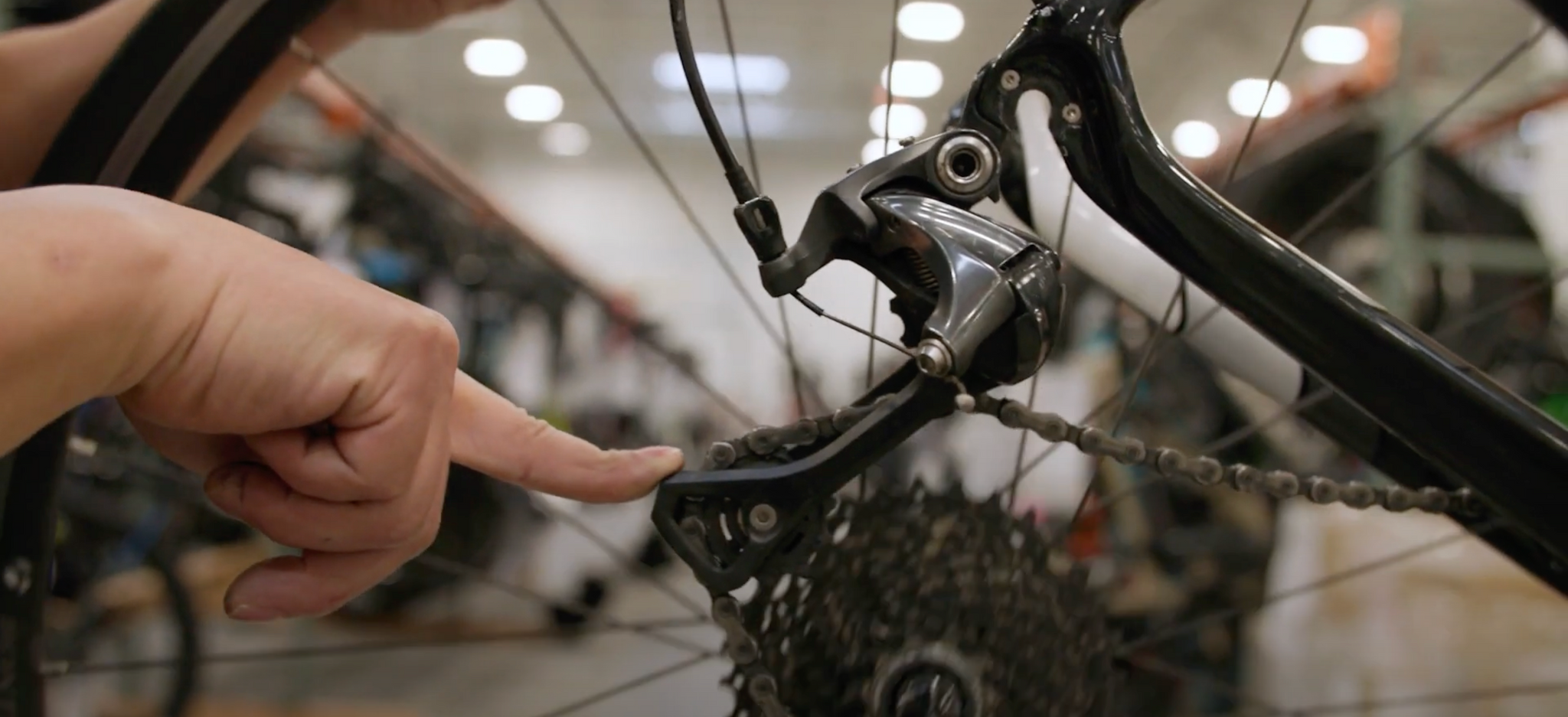Struggling to remove your rear wheel? Follow these simple steps to remove and reinstall your wheel like a pro!

Written by: Bruce Lin Published on: Apr 1, 2022 Posted in: Tech
Whether you need to fix a puncture, put your bike on a trainer, or just disassemble your bike, you need to know how to remove your wheels. A lot of riders struggle to remove the rear wheel because it can get caught up in the rear derailleur and chain. Just follow these steps, and you’ll be able to easily remove and reinstall your rear wheel in seconds. [button]Shop bikes[/button]
How to remove and reinstall your rear wheel
1. Prepare the bike

Removing the rear wheel while holding the bike up by the saddle. It’s best to remove the rear wheel with your bike in a repair stand. If you don’t have one, it’s still easy to remove the wheel while holding the bike up with one hand. Some people turn the bike upside down, but I find that makes removing rear wheels harder without gravity to assist you. Shift the rear derailleur into the hardest gear (the smallest cog, outboard on the cassette). This gives you more space and more chain slack to remove the wheel. If you have a rim brake bike, open the brake caliper’s quick-release lever. This spreads the brake pads so there’s more room for the tire to pass through. If you have a clutched derailleur (commonly on gravel bikes and mountain bikes with 1x drivetrains), disengage the clutch:
- For Shimano derailleurs, turn the clutch lever to the off position. Don’t worry, it is labelled.
- For SRAM derailleurs, push the derailleur cage forward and push the cage lock button to hold the cage in the forward, loose position.
2. Undo the rear axle

Quick-release axles: Undo the quick release lever and spin the lever counterclockwise, if you need to loosen it further. Typically, just opening the lever will be sufficient.
Thru-axles: Thru-axles are found on newer disc brake bikes. Thru-axles are larger in diameter and thread directly into the frame. Unscrew the thru-axle with an Allen wrench or the integrated handle and remove it completely.
3. Demontujte kolo
If your rear wheel doesn’t drop out easily, you’ll need to move the rear derailleur out of the way. The rear derailleur is spring-loaded. Once you’ve shifted it into the hardest gear, it’s easy to rotate it backwards so it doesn’t hold the wheel in the dropouts. You can grip the main body of the derailleur and swing the entire derailleur backward.

You want to swing the derailleur back far enough so that the upper pulley wheel is no longer blocking the cassette. Then, the wheel should easily come down and out of the dropouts.

Tip: If you get caught on the chain while removing the wheel, instead of grabbing the chain and getting chain grease on your hands, you can simply push the derailleur cage down and forward to get enough slack to move the chain out of the way.
4. Znovu nainstalujte kolo
To reinstall the rear wheel, simply reverse those steps. It should be self-explanatory, but here are a few things to pay attention to:

- Pull the derailleur back far enough so you can reinsert the wheel into the dropouts.
- Make sure to guide the chain back onto the cassette, in the smallest cog.
- If you have disc brakes, pay attention to the alignment of the disc rotor. Make sure you’re putting the wheel in straight and gently fitting the rotor between the brake pads, into the brake caliper.
Once your wheel is in the dropouts, tighten or reinstall the rear axle. If your rear derailleur has a clutch, turn it back on. If you have rim brakes, don’t forget to close the caliper quick-release.
Tip: Confirm your derailleur is still shifted into hardest gear and the chain is sitting on the smallest cog for correct alignment with dropouts.
And you’re done. Practice this procedure a few times, and you’ll be taking your rear wheel on and off like a pro mechanic!















